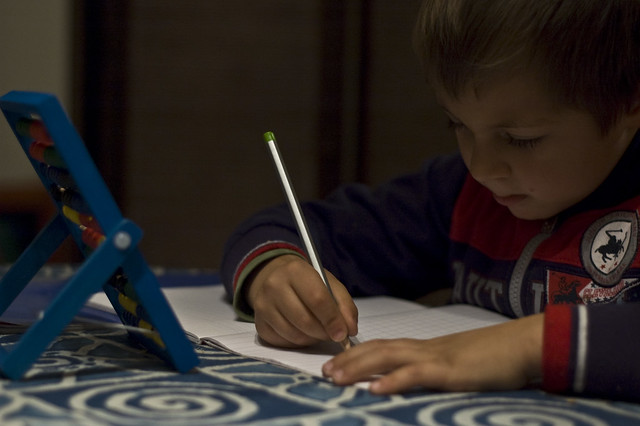
Two months ago, Boris and Andrej did not speak a single word of French. I can only imagine how completely lost they must have felt those first days in French public school, unable to make sense of anything around them. We had taught them, strategically, to say "Je veux faire pipi" (I would like to pee) and with that they were thrown in at the deep end.
Thinking rationally, I expected them to learn fast, or at least faster than your regular kid, because they already spoke three other languages fluently. But reality seemed too formidable--so many hundreds and thousands of words, plus grammar. How could they cope with that?
In a way, they had never learned a foreign language before--they simply had three native languages. I know that this is an unscientific view, since everyone is supposed to have only one really native language, the strongest of the ones you speak. But Boris and Andrej were exposed to three languages simultaneously, and picked them up more or less at the same time (Bulgarian lagged a little bit, then caught up). We could never say which one was the strongest.
During the last year of our life in Budapest they switched to speaking Hungarian among themselves, even though the quality of the other two languages didn't suffer. When they moved here, they continued using Hungarian during play. Then one day about a month and a half into their French schooling, I overheard them speak French to each other. They were parroting the words and phrases heard from other kids and it was a limited number of sentences that they used, but it was French alright. They just quietly dropped Hungarian and adjusted to the new reality. Of course, they are far from full comprehension and fluency, but ils se debrouillent beyond my most generous expectations.
I don't think they are exceptionally gifted--they just grew up in weird linguistic circumstances, and many of our friends' children are exactly the same. When you think about that ability of children to absorb whatever language is thrown at them you wonder why, even in countries with multiple official languages, bilingualism is such a hard sell. In places like Switzerland you'd think they would had bilingual kindergartens from here until next week but, in reality, multilingualism simply means that different regions speak different languages. That is a real shame (on the positive side, that means I can live here and not have to learn Swiss German--whew...).
Raised in one of the most mono-lingual societies on earth (although even that is changing), I am simply amazed at all this. And a little jealous. Patrick is the same and although I did nothing but let it happen, I can't help but be proud. Glad that Boris and Andrej are adjusting.
ReplyDeleteIncredibly amazed by your kids. But I definitely believe that having been raised in such multilingual environment helped a lot. I just read my weekly (American) Babycenter email where it was written that a minority of children from 24 to 30 months are able to count to 10. Zolika at 23 months can count to 10 in 2 languages! :)
ReplyDelete@Jennifer and Alessandra--our kids are just lucky. We often joke that Boris and Andrej speak a whole bunch of useless languages but I would gladly have traded places with them :)
ReplyDelete